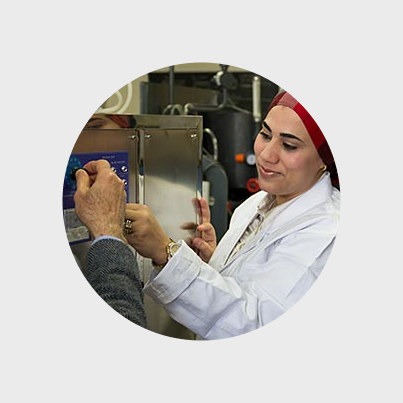Chemical Engineering Graduate Degree Program
What makes this program different?
From green biofuels, plastics and nano-fibres to medical devices, sensors and actuators, chemical engineering graduate students gain the skills and the experience to sustain the environment, support the production of life-saving medicines, and much more.
Degree
PhD, MASc, MEng
Department
Chemical Engineering
Fee range
Domestic: $9,517 - $10,622
Options
Full-time & part time, 3 specializations
State-of-the art and sophisticated facilities
From high-performance computing stations to large-scale bioreactors, we provide access to 17 specialized labs so students can perform cutting-edge experimental investigation and intensive computational research.
Learn from world-renowned faculty researchers & experts
Learn from Canada Research Chairs, lab founders, and leading researchers like Dr. Hadis Zarrin who is exploring nanocomposite membranes and electrochemical energy storage. Or Dr. Nariman Yousefi who is developing innovative water filtration technology that has the potential to revolutionize our drinking water.
Our graduates gain industry-wide acclaim & accolades
Our graduates gain industry-wide acclaim and accolades. Each year, students, faculty, and alumni, such as Reza Eslami—winner of the Mitacs Award (2022) and Governor General Award (2023)—demonstrate the significance of their research by earning prestigious industry recognition, including Minister’s Awards and more.

Explore your journey
PhD
Ideal for engineers with a master’s degree who want to pursue a career in academia or a professional research career.
MASc
Ideal for engineers with an undergraduate degree who want to pursue a specific research area or idea.
MEng
Ideal for engineers with an undergraduate degree who want to elevate their credentials and increase their job market opportunities.

Courses offered in any of the focus areas explore a diversity of topics from nanobiotechnology or applied thermodynamics to membrane technology and engineering statistics.
Whether you’re in a research-intensive program or pursuing professional development, students benefit from full-scale equipment, the latest technology and faculty with the right combination of expertise to prepare students for exciting careers.
Visit the graduate calendar for full course descriptions and see which courses are offered this academic year.
| PhD | MASc | MEng |
|---|---|---|
|
|
|
Grade requirements: If a course mark is less than B- (2.67/4.33 or 70%) for both MEng and MASc, and less than B (3.00/4.33 or 73%) for PhD, you must repeat the course or alternate with another. Failure to maintain an acceptable academic standing could result in your being asked to withdraw from the program. Failure in more than one course will be considered grounds for dismissal.

Enrich your learning through research, labs & community
Choose from three fields of study.
Research in this stream is focused on functional materials, which are organic, inorganic and/or hybrid materials with tunable shapes and sizes. Examples include sensors, printable materials, packaging or building materials, as well as composites that can withstand harsh conditions. In our department, research in this area includes crystal engineering of micro-porous materials and multifunctional nanostructures, as well as micro-fabrication methods for micro-particles, membranes and surfaces for biomedical applications. Further biomedical-related research is ongoing in the engineering of functional orthopaedic and ear, nose and throat tissues, as well as the effects of physical forces on cartilage cell metabolism.
As a student in this stream, you’ll gain specialized knowledge of the design of systems that convert raw goods into usable goods, such as sustainable energy, pulp and paper products, food, and polymerization systems.
Research in this stream engages intensively in two categories:
- Complex fluids: students perform research in fluid mixing technology, multiphase flow and visualization, reactor hydrodynamics, and non-Newtonian rheology, with the aid of computational fluid dynamics (CFD).
- Systems engineering and identification, and process synthesis and analysis: students perform research in optimal design and control, non-linear process control, statistical modeling and analysis, and the infrared-drying process of polymer-based materials.
With enormous implications for our environment, research in this stream is focused on industrial wastewater treatment, including application of ozone technology and polymer surface modification. Mass transfer in a packed bed and membrane filtration are also studied, as are bioreactors for wastewater treatment and nutrient removal. In addition, advanced oxidation technologies, biological processes, and photochemical and biochemical reaction engineering are a focus of this stream.
TMU is home to over 130 state-of-the art engineering and architecture-focused labs and facilities. Whether you’re interested in polymers that can help detect tumour cells, tissue engineered for spinal cord repair, or aquifers designed to withstand climate change, revolutionary research is happening in our 17 dedicated chemical engineering labs.

Whether you’re looking to join a student group, advocate for your peers in student government, challenge yourself and others at our graduate symposium, or just looking for support, we encourage you to make the best of your experience at TMU.

What can you do with this degree?
Career possibilities
Chemical engineering graduates find there are endless opportunities where the skills gained from their degree are responding to urgent demands. Many of our graduates go on to rewarding careers with government agencies, private water treatment facilities, research and teaching positions. With expertise spanning from functional materials, green biofuels, renewable resources and more, there are unlimited career opportunities across agriculture, oil and gas, mining, biotech and pharmaceutical industries.
Possible employers:
- 3M
- AGAT Laboratories
- Atomic Energy of Canada Limited
- Environment and Climate Change Canada
- Husky Energy
- Maple Leaf Foods
- Sanofi Pasteur
- Sofina Foods

Melody Johnson
Senior Consultant at Blue Sky Energy Engineering and Consulting Inc.
“I chose to earn my graduate degrees at Toronto Metropolitan University because of its world-class faculty, strong focus on water/wastewater process engineering and numerous career-expanding resources.”
Chemical Engineering (MASc) ’07, (PhD) ʼ22

Dr. Samin Eftekhari
CEO, Artin Biomed
“TMU supported me to step out of academia and into the business world.”
Chemical Engineering (PhD) ʼ16

Dr. Amira Abdelrasoul
Professor, University of Saskatchewan
“I knew [TMU] would challenge me to become an independent researcher capable of applying chemical engineering principles, as well as advanced analytical and experimental techniques, to largescope, open-ended research problems."
Chemical Engineering (PhD) ʼ15

Funding & awards for chemical engineering students
MASc and PhD students receive a guaranteed funding package valued at the level of their tuition plus at least $10,000 (MASc) or $15,000 (PhD) in additional funding and/or employment distributed each term. This funding is renewable annually based on academic performance and availability of funds. Students also have the opportunity to work as teaching, graduate and research assistants to supplement their program of study.
There are also a number of scholarships and awards available specifically for chemical engineering graduate students including:
PhD Excellence Award
This annual award is reserved for one chemical engineering PhD student in of the second, third and fourth year of the program. To be eligible, applicants must demonstrate excellence in academic and research work, and have a minimum CGPA of 3.67 (A-) on PhD courses completed as of August 31st in the prior academic year. Please apply through AwardSpring (external link)
MASc Excellence Award
Applicants must be registered in the second year of the chemical engineering MASc program. They must also be able to demonstrate excellence in academic and research work, and have a minimum CGPA of 3.67 (A-) on MASc courses completed as of August 31st in the prior academic year. Please apply through AwardSpring
(external link)
MEng Excellence award
Applicants must be registered in the second year of the chemical engineering MEng program. They must also be able to demonstrate excellence in academic achievements, and have a minimum CGPA of 3.67 (A-) on MEng courses completed as of August 31st in the prior academic year. Please apply through AwardSpring (external link)
Dr. Robert A. Guerriere Award
This annual award in the amount of approximately $2,000 is presented to two students who have completed the final year of the undergraduate chemical engineering co-op program at Toronto Metropolitan University, and are enrolled in a MASc or MEng chemical engineering program at Toronto Metropolitan University. Please apply through AwardSpring. (external link)
